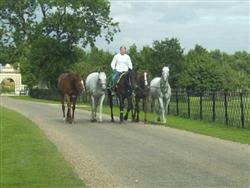
Develop your understanding of equine behaviour and your ability to apply that to the welfare and training of the horse
Behaviour is any externally observable activity of an animal. In general, it includes:
• Movement of parts of the body
• Stopping expected movement
• Secretions from the body
• Changes in body colour
Student Comment: "The course was more in depth than I thought it would be and it was information that I could apply with my own horses. The feedback was very helpful and it was information that could only have been gained from experience with horses. My tutor would always answer any questions that I have and always had something positive and helpful to say!" Paula Grima, Australia - Equine Behaviour course.